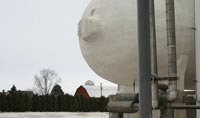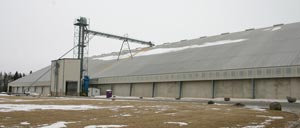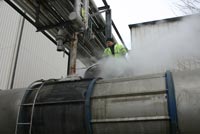About
Refining and Redefining the Future

Fox River Valley Ethanol works toward a better tomorrow for consumers, for local grain-marketing companies, for farmers, and for our community. We process locally grown corn to generate a renewable resource, securing energy independence while creating other useful products for agriculture and industry. All the while we’re providing jobs that bolster the local economy.
Construction on the original 20-million-gallon plant near Oshkosh started in 2002. Under the Utica Energy banner, this plant opened for business in 2003. Almost immediately, customers signaled the need for additional capacity, so by 2004 the plant expanded to create 40 million gallons of ethanol yearly.
Adding a grain dryer in nearby Pickett in 2005 gave the plant the ability to add value to wet meal created by ethanol processing. Including a second grain delivery location, GB Elevator, in Green Bay in 2011 expanded our ability to secure corn needed to maintain a round-the-clock production system.
Ace Ethanol acquired all Utica Energy facilities in 2013, infusing our operation with new dedication for efficiency, capacity, and top-quality products. Members and a member board of directors include farmers and local investors who understand the value of a local grain marketing opportunity that results from renewable energy processing.
Our Customers
 Our Customers include farmers’ cooperatives and grain elevators. Their deliveries of 53,000 to 55,000 bushels of corn per day fuel our ethanol plant. That’s two semi-trailer loads processed each hour for twenty-four hours per day and 365 days a year.
Our Customers include farmers’ cooperatives and grain elevators. Their deliveries of 53,000 to 55,000 bushels of corn per day fuel our ethanol plant. That’s two semi-trailer loads processed each hour for twenty-four hours per day and 365 days a year.
Our Capacity

Storage Capacity for 420,000 bushels in our plant’s grain bins and in an adjoining 3.2-million-bushel flat storage building have combined potential of sustaining our production pace for two and a half months. In Green Bay, we can hold 720,000 additional bushels. All corn in storage is previously dried to our quality standards by our grain elevator customers. Wet grain delivered during peak harvest times is used immediately.
Our Products
 Of the products we create, Ethanol is clearly central. In a typical day, our plant produces 150,000 gallons for a total of over fifty million gallons a year. Eighty percent is sold in the state of Wisconsin, primarily to terminals in the Green Bay-Madison-Milwaukee area. All ethanol ships in tanker trucks.
Of the products we create, Ethanol is clearly central. In a typical day, our plant produces 150,000 gallons for a total of over fifty million gallons a year. Eighty percent is sold in the state of Wisconsin, primarily to terminals in the Green Bay-Madison-Milwaukee area. All ethanol ships in tanker trucks.
- Wet Distillers grains and solubles, co-products of our ethanol production, offer local dairy operators and livestock producers a valuable high-protein resource. Animals appreciate tasty wet-cake distillers grains in their ration, and we sell to farmers, who arrive with their own trucks, at a pace of 500 tons per day. The product factors out at 9% crude protein, 4% fiber, and 1.5% fat at 60% moisture.
- Any production not marketed as wet cake is dried and sold as DDGS (dried distillers grains and solubles). With a nutritional profile of about 28% protein, 4% fat, and 10% fiber, this is a stable, low-moisture product that is mostly exported.
- A steady market for the CO2 our plant generates during the refining process supplies the food and beverage industry. All CO2 we sell meets GFSI (Global Food Safety Initiative) standards—a worldwide, business-driven program to achieve quality production standards and the FDA Food Modernization Act (aimed at preventing food contamination). It’s a valued tool for meat and poultry processing, soda and beer manufacturing, and in taconite mining. Our CO2 production offers a renewable alternative to mined CO2.
Quality and Safety
 Quality procedures protect our products and the environment. At every step of our process, we efficiently capture and recirculate exhaust water and steam. For example, once wet corn fiber and syrup are processed to create dried distillers grains and solubles (DDGS), dryer exhaust air recirculates to a thermal oxidizer and becomes nothing more complicated than water and carbon dioxide. Cooling water and boiler water used throughout the plant are both constantly monitored, too, to control mineral deposits and bacteria growth. No wastewater is generated, and only non-contact cooling water and boiler blow down water is sent to the local water treatment plant.
Quality procedures protect our products and the environment. At every step of our process, we efficiently capture and recirculate exhaust water and steam. For example, once wet corn fiber and syrup are processed to create dried distillers grains and solubles (DDGS), dryer exhaust air recirculates to a thermal oxidizer and becomes nothing more complicated than water and carbon dioxide. Cooling water and boiler water used throughout the plant are both constantly monitored, too, to control mineral deposits and bacteria growth. No wastewater is generated, and only non-contact cooling water and boiler blow down water is sent to the local water treatment plant.
Carbon dioxide and vapors created during fermentation are routed to one of three task-specific scrubbers to assure we produce pure substances for our CO2 or emit only safe streams into the atmosphere. Dust from unloading, conveying, and grinding corn is filtered from the air and returned to our manufacturing processes.
We routinely use clean-in-place techniques to sterilize heat exchangers, pipes, and tanks as well as mash preparation equipment. As for our primary product, ethanol quality is checked every day and again before it ships.
Safety procedures ensure safe employees, safe products, and safe interaction with the environment. We implement a behavior-based safety training program for all employees. Every employee is trained to understand the value of safety manuals and our emergency plans. Each week, employees attend a Toolbox safety talk and every outside contractor is expected to train in our safety program that includes personal protective equipment—specific by plant area—for every person who enters the plant. Most of our employees are CPR trained, and all of our facilities are equipped with an automated external defibrillator.
